Last updated: January 24, 2024
Article
A Rise to Prominence: John F. Kennedy’s Paternal Lineage
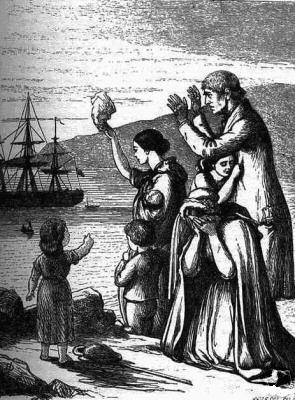
Library of Congress
The Kennedy family name was not always synonymous with wealth, power, and politics. The family's origins can be traced back to a young Irishman, Patrick Kennedy. Patrick was the son of a farmer of modest means. After the disastrous effects of The Great Famine, Patrick left Ireland for the United States to seek better opportunities. His struggle to make a comfortable life for himself and his family was echoed by his son and later his grandson, profiling the family’s path to success. Patrick likely would have never dreamed that his great-grandson would become the 35th president of the United States.
Patrick Joseph Kennedy (1823-1858)
Born in Dunganstown, County Wexford, Ireland, Patrick Kennedy followed a typical path of a young Irish male, during this time period. He was the son of a farmer of modest means. With two older brothers, Patrick stood little chance of inheriting the family farmstead.
These were desperate times for the Irish. Much of the land in Wexford was owned by non-Irish property owners, Catholics were harassed by authorities, and illiteracy was common. Younger males, especially the second or third-born like Patrick, were generally encouraged to emigrate due to widespread poverty and scarcity of resources. The economic and agricultural crisis, known as the Great Famine, additionally pressured citizens to look for better opportunities abroad.
Traveling had its own risks. It's estimated that eight to nine thousand Irish immigrants lost their lives on the voyage to the United States alone. Kennedy could easily have been one of those casualties. Considerably more fortunate than many other Irish immigrants, Patrick found work as a barrel maker at a local cooperage in Boston. In 1849 he married Bridget Murphy, who had also braved the transatlantic crossing, and the couple had five children together. Their first son, John, lost his life to cholera, a disease that often ran rampant in the dirty urban dwellings where many immigrants were forced to live. Tragically in 1858, Patrick also succumbed to cholera. Bridget, Patrick Joseph "P.J.", the couple's second son, and the rest of the family were left to fend for themselves.
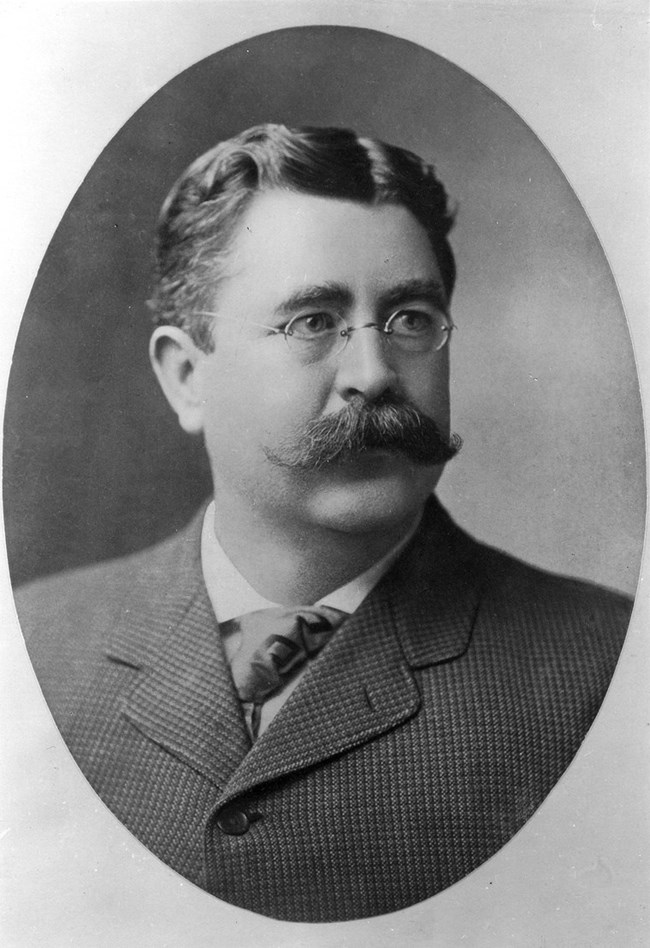
John F. Kennedy Presidential Library and Museum, KFC 2706 (PC 245)
Patrick Joseph "P.J." Kennedy (1858-1929)
Left fatherless shortly after his birth, P.J.'s upbringing was left solely to his mother. Determined to give her son a better life than the one she endured, Bridget worked hard to acquire a small stationary business. Eventually she expanded her business into a grocery that proved quite successful, affording the Kennedy family additional financial stability. Young P.J. was even able to attend Sacred Heart, a private Catholic school in Boston. In his adolescence, P.J. became a stevedore at the Boston waterfront.
P.J.'s social rise began in the 1880s, when he acquired a failing saloon. Once his business thrived, he invested in several other establishments and then ventured into liquor distribution. Alcohol consumption was prevalent among Boston's Irish and a great deal of social activity was focused around saloons. Thus P.J. played a pivotal role in his community, providing a sympathetic ear to the destitute and frequently lending economic assistance to those in need.
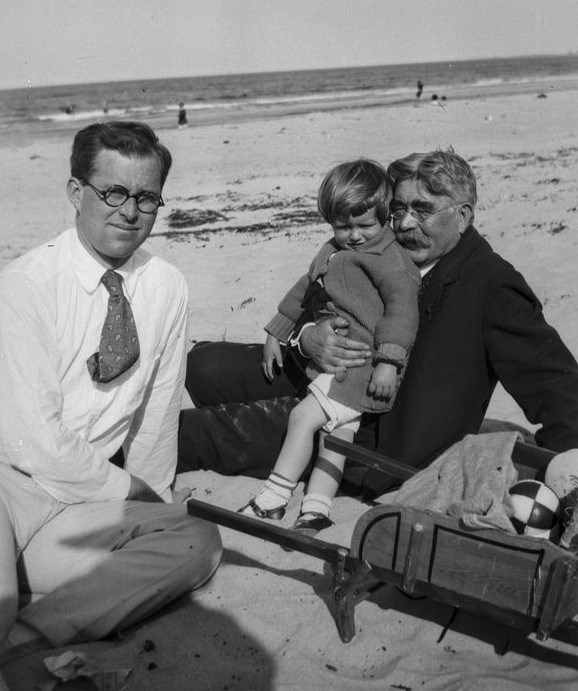
Photographer unknown. Copyright John F. Kennedy Library Foundation. Kennedy Family Collection. John F. Kennedy Presidential Library and Museum, Boston. KFC888N
In the mid-1800s Boston's employment opportunities were limited. Immigrants typically left Boston for more industrial cities across Massachusetts, like Lowell, and elsewhere. Many Irish immigrants spent their entire savings on the voyage over. Upon their arrival, many were penniless and stranded in Boston. This led to a ballooning of Boston's Irish population and a rise in anti-Irish sentiment among Boston's native-born citizenry. Thus, in his effort to escape the confines of the immigrant social class, P.J. faced great challenges.
As a result of his local popularity, P.J. became active in Boston's political scene. Thanks to his largely sympathetic and often generous nature, he mustered a great deal of support in his respective Ward Two. In 1886, he was elected into the Massachusetts House of Representatives. Later he became a state senator, remaining active in Massachusetts politics until 1895. P.J. became the first of his family to attain recognizable status in American society.
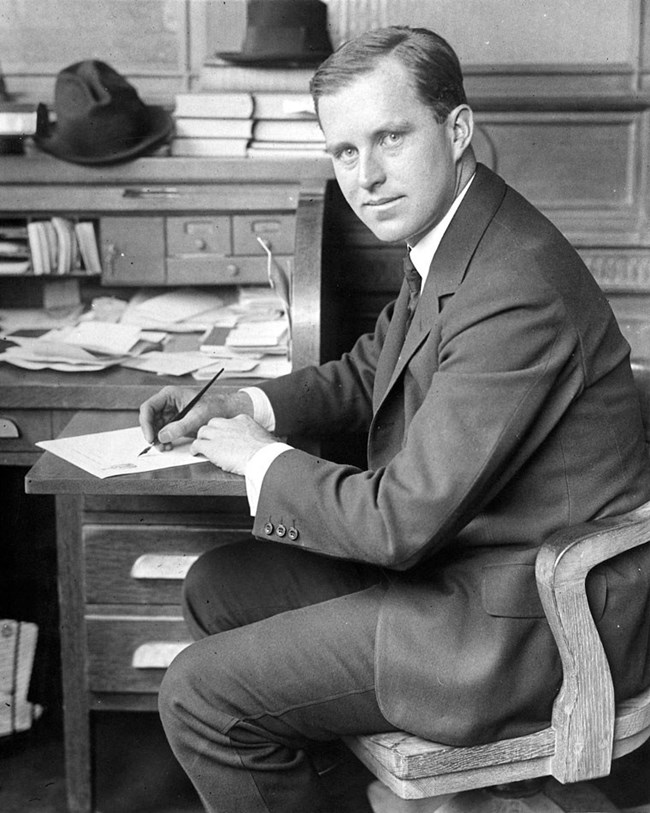
Underwood & Underwood Studio/John F. Kennedy Presidential Library.
Joseph Patrick Kennedy Sr.
(1888-1969)
It was with this generation that the Kennedy family name became one associated with political prominence and economic success. Like his father, Joseph was born and raised in Boston. However, P.J.’s relatively successful career allowed Joe to grow up with a measure of comfort that P.J. himself did not enjoy in his youth. As a result, Joe received his education at Boston’s finest, Protestant-affiliated schools. He attended high school at Boston Latin School and then earned his college degree at the esteemed Harvard University.
Joe started his career in banking within two years of graduating college by becoming a bank examiner for the Commonwealth of Massachusetts. He was able to save his father’s failing bank, Colombia Trust Company, from a financial takeover and became its president.
On October 7, 1914, Joe married Rose Elizabeth Fitzgerald, the daughter of Boston's mayor John F. "Honey Fitz" Fitzgerald, and the two moved into their first home at 83 Beals Street, Brookline, MA. As a gifted student, talented musician, speaker of several languages, and world traveler, Mrs. Kennedy was intelligent and accomplished. She proved to be a devoted wife and became heavily invested in the raising of the couple's nine children.
During WWI, Joe assumed the position of assistant manager at the Fore River Shipyard in Quincy, MA. The facility was open 'round the clock, producing warships and transports. The work was demanding and Joe would later say that he worked harder at the shipyard than anywhere else. Joe earned a better salary there than when he was employed as a bank president. In 1920, Joe moved his family into a larger Brookline home in a more affluent neighborhood.
As Joe accumulated wealth, he quickly invested it in the stock market. His career in banking provided him with a solid knowledge of the intricacies of finance and so he was well suited for trading stocks. He managed to secure his wealth just prior to the major crash that led to the Great Depression and invested in a number of lucrative ventures. Joe then entered the world of film production, acquiring a relatively minor film studio called Film Booking Office of America (FBO.) Film production earned him a handsome five million dollars, about 65 million in today’s currency.
Following prohibition, Joe also acquired the sole distributing rights to Dewar’s Scotch and Gordon’s Gin. He was immensely successful as a businessman and able to provide the economic comfort, which he so greatly desired for his family. It was after his business career that he then entered the realm of politics.
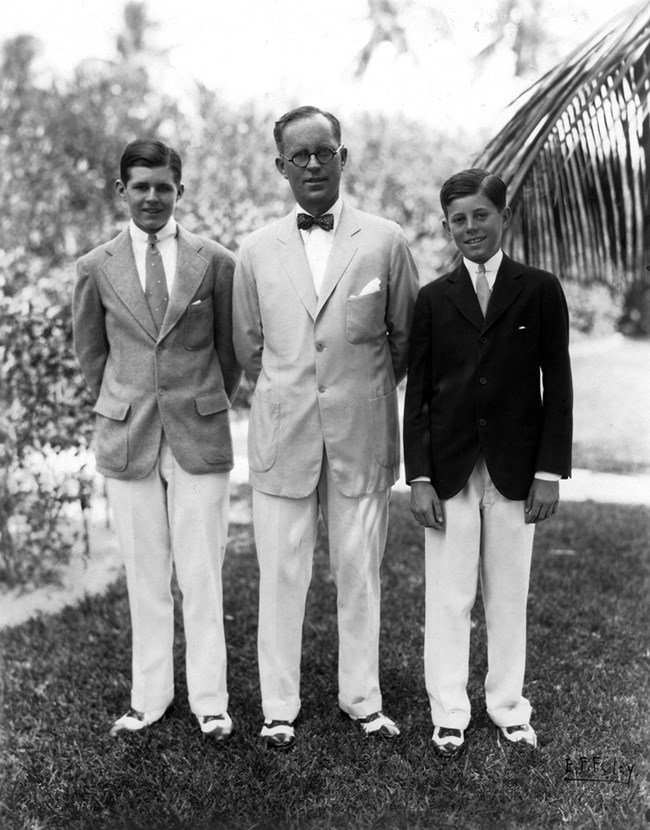
Photograph by E. F. Foley in the John F. Kennedy Presidential Library and Museum, Boston. KFC461P
As an avid supporter of Franklin D. Roosevelt during his presidential campaign, Joe was rewarded by Roosevelt upon his election. With his strong experience in the field of market trading, Joe was appointed first head of the U.S. Securities and Exchange Commission (SEC.) His career in the shipyards at Quincy led to a second appointment , as the first head of the U.S. Maritime Commission. Roosevelt later appointed Kennedy to serve as the U.S. Ambassador to Great Britain, a position which he held from 1938 to late 1940. Though Kennedy eventually fell out of Roosevelt’s favor, his fame had been cemented. Joe later used his vast wealth and connections to assist his sons, John, Robert, and Edward "Ted", as they pursued political office.
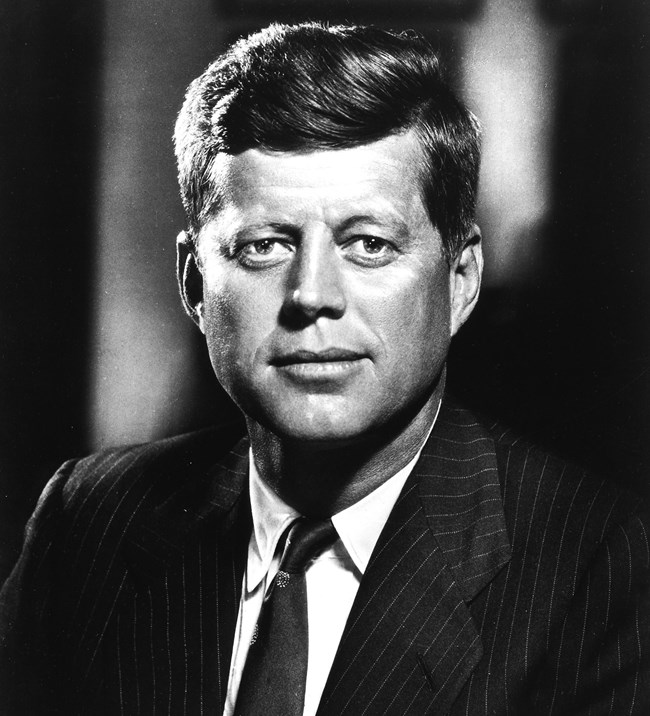
Bachrach Studios
John Fitzgerald Kennedy
(1917-1963)
John F. Kennedy was born on May 29, 1917 in his family's home at 83 Beals Street, Brookline, Massachusetts. Born into a comfortable life, John's family was not particularly wealthy during his first few years. However, Joseph P. Kennedy's wealth was quickly skyrocketing. Despite material comforts, John's youth was not an easy one. He was often very ill and almost succumbed to scarlet fever in 1920. Throughout his entire life, he was plagued by serious health issues.
John attended the Edward Devotion School (now known as the Florida Ruffin Ridley School,) a public school in Brookline, through part of his third-grade year. He was then enrolled at the private Dexter School with his older brother Joseph Jr. The decision to send the boys to private school, where they would be in closer proximity to children of wealthy and connected families, reflected Mr. and Mrs. Kennedy's desire to prepare the boys for working within America's elite social circles. When John and Joe Jr. enrolled at Dexter, "Kennedy" was the only Irish name listed on the roster. The boys later attended Choate (now known as Choate-Rosemary Hall,) a private high school in Wallingford, CT, and then attended Harvard University. John earned his Bachelor of Arts Degree in Government, with a focus in international affairs.
John was never an exemplary student in the traditional sense, but loved to read, had a bright intellect, and established himself as a gifted writer. With his father’s encouragement, John published his final thesis Why England Slept. It focused on Britain's delayed reaction to Nazi aggression in Europe. John had traveled throughout Europe when his father was ambassador to Great Britain and so his writing was layered with many insightful, firsthand accounts. Why England Slept proved immensely popular.
Following college, John entered the U.S. Navy. Not content with a desk job, he managed to get himself assigned to action in the Pacific Theater of WWII. Kennedy was the commander of Patrol Torpedo Boat 109 (PT109.) When the boat was sunk by a Japanese destroyer, Kennedy rescued his crew and became a decorated war hero. Meanwhile, Joe Jr. was serving in the European Theater of the war as a navy pilot. Tragically, he lost his life flying a dangerous volunteer mission in 1944.
Joseph Kennedy Sr. had been grooming both of his sons for political office. However, the weightiest of expectations often rested with Joe Jr. With Joe Jr.'s death, John likely felt a sense of obligation to carry on his family's dream. However, his own passions and interests were very much pointing him in the same direction. After all, he had already established fame as a writer and war hero. He loved history, traveled extensively, and had some first-hand experience in international affairs. He was also articulate, handsome, and charming. While not fully formed, John F. Kennedy had the early makings of a future national leader.
In 1946, Kennedy took his first steps into the political realm by winning a seat in the U.S. House of Representatives, the Eleventh Congressional District of Massachusetts. After six years of service in the U.S. House of Representatives, Kennedy ran for the U.S. Senate. Despite the 1952 election year favoring Republicans nationwide, Kennedy won his seat by defeating Massachusetts incumbent Henry Cabot Lodge Jr.
In 1953, Kennedy married Jacqueline "Jackie" Bouvier at St. Mary's Church in Newport, Rhode Island. The handsome and fashionable couple became mainstays in the media, capturing the fascination of many Americans. After a debilitating back surgery in 1954, Kennedy used his convalescence to write a new book, Profiles in Courage. It was a collection of short biographies about eight U.S. Senators who made decisions that ran against their party and constituents, but ultimately proved to be for the greater good of the nation. After its release in 1956, Profiles in Courage became a bestseller and won the Pulitzer Prize in 1957.
In 1956, Kennedy made a bid to become the Vice Presidential candidate to Adlai Stevenson in the presidential race. He narrowly lost to Estes Kefauver but gained additional national exposure by providing the nominating speech for Stevenson at the 1956 Democratic National Convention. In 1960, Kennedy made his own bid for the presidency, became the democratic front-runner, and defeated the Republican Party candidate, Richard M. Nixon. At age 43, Kennedy became the youngest-elected American president and the first Catholic.
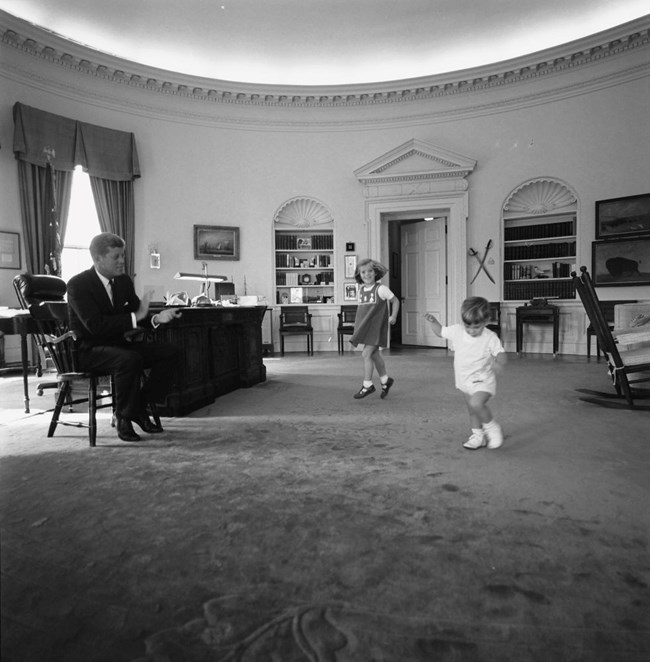
Cecil Stoughton. White House Photographs. John F. Kennedy Presidential Library and Museum, Boston, MA. ST-441-10-62
Kennedy possessed a strong knowledge of American history, was forward-thinking, and articulate. His inaugural address remains one of our nation's best-remembered speeches. His most famous line, "ask not what your country can do for you, ask what you can do for your country", inspired an entire generation of Americans to public service. Kennedy symbolized youth and vigor and many Americans were hopeful that he would deliver on his promises for a better future.
During his presidency, Kennedy created the Peace Corps, he challenged Americans to be first to the moon, he crafted the Civil Rights Act, and signed the Equal Pay Act. He was also the first president who helped establish major laws to help those with intellectual disabilities. During the Cuban Missile Crisis, when nuclear confrontation loomed, he was instrumental in de-escalating tensions. Kennedy was also the first president to start modern televised press conferences. He was a natural in front of the camera and used his humor, charm, and wit, to connect with his audiences. Kennedy was widely popular in the United States and abroad.
On November 22, 1963, the unimaginable happened: John F. Kennedy was assassinated in Dallas, Texas. His life and presidency was cut short by an assassin's bullet. Television coverage of the funerary services enabled the nation to participate and mourn collectively. For those alive at the time, Kennedy's assassination made a lasting impact. Many can recall exactly where they were and what they were doing, when they received the shocking news. Many were left guessing as to what may have been, had he lived. Despite his short time in office, Kennedy's vision, charisma, and eloquence made him an enigmatic leader whose legacy and popularity continues today.
John F. Kennedy's rise to power represents the American Dream realized in its grandest vision. Just several generations removed from Ireland's working class, Kennedy became President of the United States. While Kennedy possessed a variety of important skill sets that made this achievement possible, the hard work of his ancestors to lay the foundations for his success cannot be understated.
Tags
- john fitzgerald kennedy national historic site
- kennedy family
- john f. kennedy
- joseph patrick kennedy sr.
- patrick kennedy
- patrick joseph (pj) kennedy
- irish american history
- irish-american heritage
- irish-american heritage month
- irish
- irish-american
- irish heritage
- irish history
- president
- president kennedy
- presidency
- presidential history
- presidential
